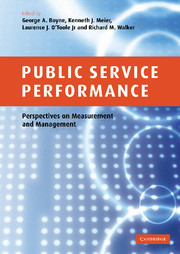Book contents
- Frontmatter
- Contents
- List of figures
- List of tables
- Notes on contributors
- 1 Introduction
- 2 Subjective and objective measures of organizational performance: An empirical exploration
- 3 All measures of performance are subjective: More evidence on US federal agencies
- 4 A qualitative evaluation of public sector organizations: Assessing organizational performance in healthcare
- 5 Quantitative approaches towards assessing organizational performance
- 6 Consequences of goal ambiguity in public organizations
- 7 Performance control and public organizations
- 8 Bureaucratic red tape and organizational performance: Testing the moderating role of culture and political support
- 9 All that glitters is not gold: Disaggregating networks and the impact on performance
- 10 Network evolution and performance under public contracting for mental health services
- 11 The design and management of performance-based contracts for public welfare services
- 12 Outsourcing government information technology services: An Australian case study
- 13 International comparisons of output and productivity in public service provision: A review
- 14 Public management and government performance: An international review
- 15 What drives global e-government? An exploratory assessment of existing e-government performance measures
- 16 Public management and organizational performance: An agenda for research
- Index
- References
4 - A qualitative evaluation of public sector organizations: Assessing organizational performance in healthcare
Published online by Cambridge University Press: 22 September 2009
- Frontmatter
- Contents
- List of figures
- List of tables
- Notes on contributors
- 1 Introduction
- 2 Subjective and objective measures of organizational performance: An empirical exploration
- 3 All measures of performance are subjective: More evidence on US federal agencies
- 4 A qualitative evaluation of public sector organizations: Assessing organizational performance in healthcare
- 5 Quantitative approaches towards assessing organizational performance
- 6 Consequences of goal ambiguity in public organizations
- 7 Performance control and public organizations
- 8 Bureaucratic red tape and organizational performance: Testing the moderating role of culture and political support
- 9 All that glitters is not gold: Disaggregating networks and the impact on performance
- 10 Network evolution and performance under public contracting for mental health services
- 11 The design and management of performance-based contracts for public welfare services
- 12 Outsourcing government information technology services: An Australian case study
- 13 International comparisons of output and productivity in public service provision: A review
- 14 Public management and government performance: An international review
- 15 What drives global e-government? An exploratory assessment of existing e-government performance measures
- 16 Public management and organizational performance: An agenda for research
- Index
- References
Summary
Introduction: The growth of qualitative evaluation
There has been growing interest in using evidence-based policy as a more rational basis for decision making in public policy in various countries in the 1990s (Dopson et al. 2005). This trend has been an influence on the post-1997 New Labour government in the United Kingdom (UK) where its so-called ‘modernization’ of government (Cm4310 1999) seeks to improve the use of research and evidence to ascertain ‘what works’. Policy making is here a continuous learning process with iterations with an improving research base to build the ‘experimenting society’ (Oakley 2000), first promised in the wake of pioneering evaluations into the Great Society programmes in the US in the late 1960s, then forgotten and rediscovered in the 1990s.
These ideas have been prominent in the evidence-based medicine movement in healthcare. Healthcare has a strongly developed research tradition, both in traditional biomedical science (where the Cochrane Collaboration undertakes overviews or ‘meta analyses’ of available randomized controlled trials (RCTs)) and more recently in multidisciplinary and social science informed forms of health services research. An area of rising interest has been the evaluation of service delivery and organization in healthcare (Fulop et al. 2001), where non-traditional methods of qualitative and action research are apparent. There is increasing demand for evaluation from governmental funders, including (perhaps counterintuitively) qualitative as well as quantitative research.
- Type
- Chapter
- Information
- Public Service PerformancePerspectives on Measurement and Management, pp. 55 - 74Publisher: Cambridge University PressPrint publication year: 2006
References
- 5
- Cited by



